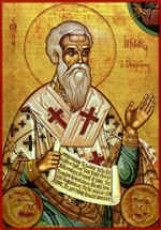Saint Ignatius of Antioch
St. Ignatius was the Bishop of Antioch after St. Peter and then St. Evodius who died around 67 AD. Eusebius records that St. Ignatius succeeded St. Evodius, and it is reported that St. Peter himself appointed Ignatius to the see of Antioch. Ignatius is a Greek name, and he also called himself Theophorus, “God Bearer”. Tradition says he was one of the children that Jesus took in His arms and blessed. St. Ignatius is one the Apostolic Fathers, the earliest authoritative group of the Church Fathers. His authority is based on being a Bishop of the Church, and living his life in the imitation of Christ. It is believed that St. Ignatius along with his friend Polycarp were disciples of the Apostle St. John.
St. Ignatius wrote a series of letters that have been preserved as an example of very early Christian Theology. Important topics addressed in these letters include ecclesiology, the sacraments, and the role of Bishops. Epistles attributed to St. Ignatius report that he was arrested in Syria and taken back to Rome. He writes, “From Syria to even Rome, I fight with wild beasts, by land and sea, by night and by day, being bound amidst ten leopards, even a company of soldiers, who only grow worse when they are kindly treated”. Along this route he wrote six letters to the Churches in the region, and one to a fellow Bishop. He was sentenced to die at the Colosseum. The year of his death was 108.
Practical Take Away
St. Ignatius of Antioch was a Bishop of our very early Church. He is thought to have been one of the children that Jesus held in his arms and blessed. St. Peter himself appointed St. Ignatius to be the Bishop of Antioch. Because of his position, he is one of our Apostolic Fathers, for the early help in building our Church. He was arrested in Syria, and brought back to Rome, and was thrown into the Colosseum, where he was Martyred by lions. His life’s work not only set the foundation for the Catholic Church we have today, but it reminds us of the multitude of sacrifices our early Apostolic Fathers went through, so we could openly practice our faith today. Great saints made great sacrifices and St. Ignatius was one of them.

No comments:
Post a Comment